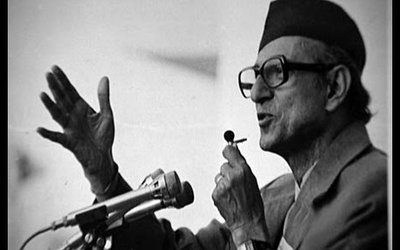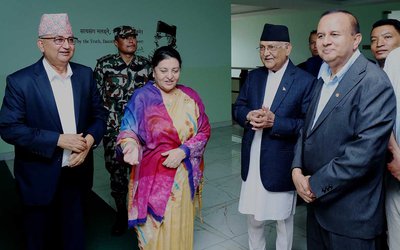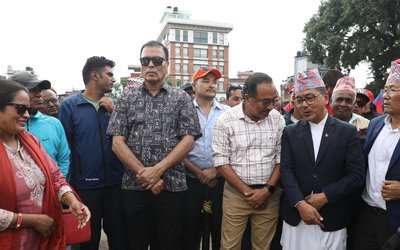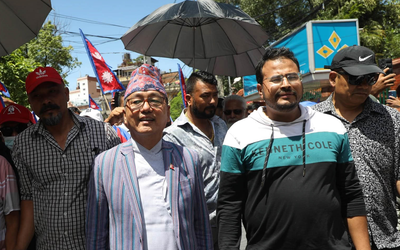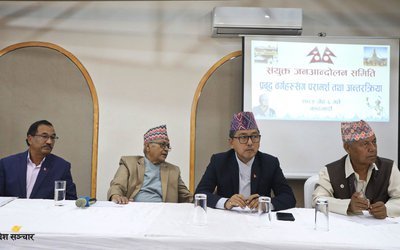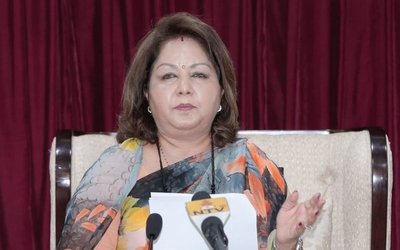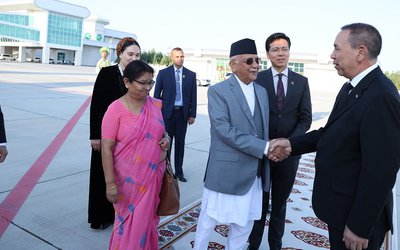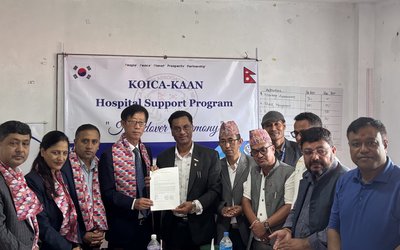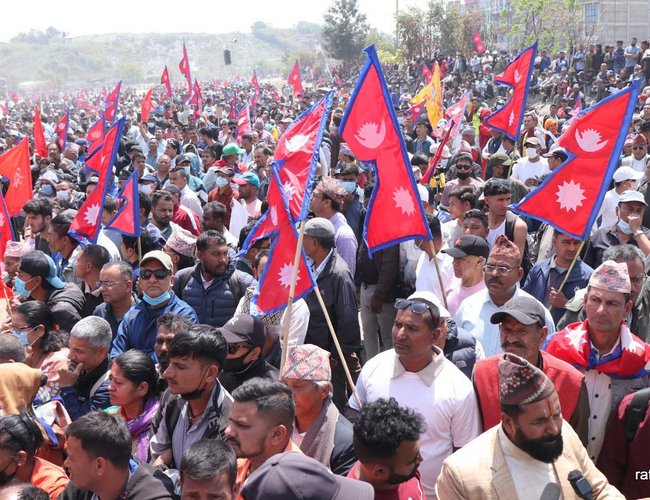
Deputy Prime Minister and Former Home Minister Kamal Thapa was manhandled, beaten, and arrested by police during a peaceful demonstration. A viral picture showed Thapa being dragged by police on a blacktop road.
Following this incident, YCL activists, a sister organization of the Maoist center, threw stones at a peaceful gathering of monarchists paying homage to late King Birendra and his family. The leaders of the ruling parties Nepali Congress, CPN-UML, and Maoist Center are now facing a growing threat from monarchist and Hindu state loyalists who are gaining support.
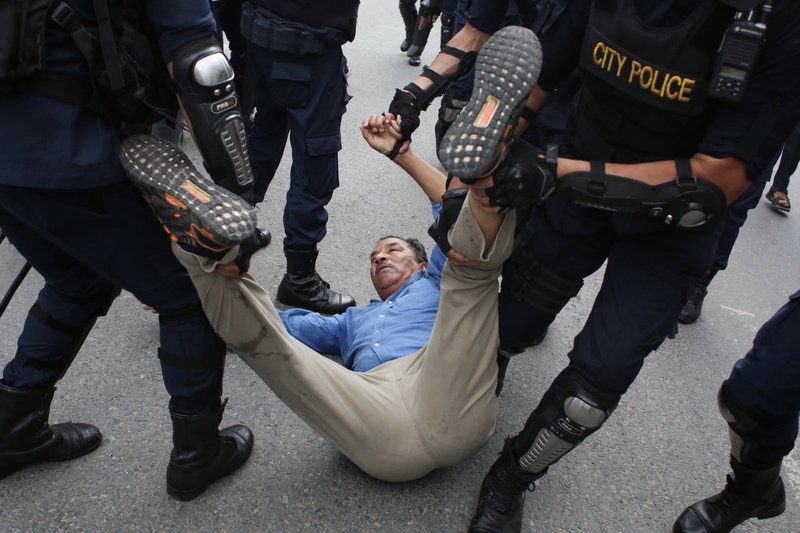
Frustrated with government performance and corruption, people are turning to the Monarchy and Hindu forces as an alternative. Prime Minister KP Sharma Oli and Maoist leader Prachanda have instructed their supporters to confront Royalist and Hindu supporters.
After his release, former home minister and pro-monarchist leader Thapa called for the protection of individual and human rights. Despite the inhumane actions of the police and ruling party leaders, human rights groups have not condemned or deplored the incidents.
Seventeen years have passed since Nepal transitioned into a republican era, marking the end of the 240-year reign of the Shah monarchy. Despite the abolition of the monarchy, Kamal Thapa, the leader of the Rastriya Prajatantra Party Nepal, which advocates for the reinstatement of the Hindu nation and monarchy, has expressed his views on the current state of affairs in Nepal under a republican system.
Thapa, who believes that the monarchy is crucial given Nepal's geopolitical and internal circumstances, has stated, "If the parties supporting the republic had performed well, our relevance would have diminished."
He emphasized that their stance on the monarchy and a Hindu nation remains unchanged. However, he acknowledged that if the republic had effectively brought peace, stability, and prosperity to the people, their agenda would have naturally faded away. Due to the perceived shortcomings of the current system, they feel compelled to continue advocating for their cause.
On the anniversary of the establishment of the republic, pro-monarchy groups have initiated an indefinite protest demanding the reinstatement of the monarchy and the reversal of changes such as federalism and secularism.
Prime Minister Oli, who is gearing up for Republic Day celebrations, has instructed his supporters to counter royalist demonstrations, sparking concerns from organizations like the National Human Rights Commission.
Former King Gyanendra, who had assumed direct rule, was compelled to relinquish power in 2005 following the second people's movement, which was based on a 12-point agreement between the then seven-party alliance and the Maoist rebels. The signing of a comprehensive peace accord between the government and the Maoists in November 2006 formally ended the Maoist armed conflict. Nearly
two years later, the first meeting of the Constituent Assembly declared Nepal a republic, marking the official transition to a republican form of governance. The former king, now living as a regular citizen, made a public appeal on Democracy Day to garner support in "saving the nation," which has reinvigorated pro-monarchy activists.
Rastriya Prajatantra Party (RPP) President Rajendra Lingden stressed that the restoration of the monarchy will be achieved through the people's support.
He noted that historical changes in Nepal have not typically been driven by elections, citing the examples of the changes in 2007 and 2017. Lingden highlighted that the transformations in Nepal in 2046, 2062, and 2063 also did not result from electoral processes.
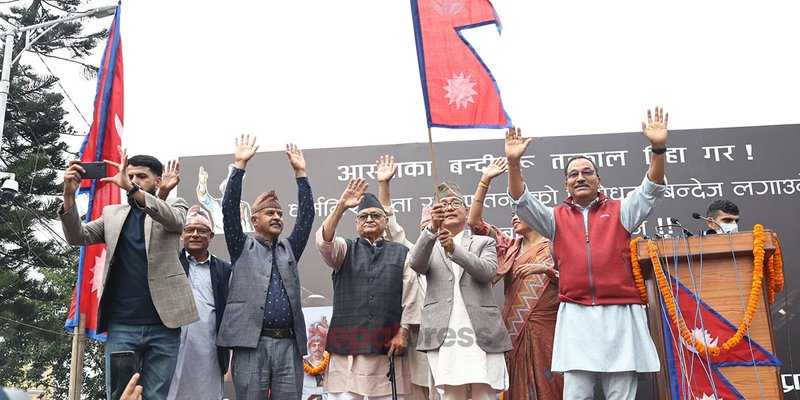
Therefore, he emphasized the importance of a people-driven approach in the current efforts for change. Lingden underscored the necessity of unity among monarchists and strategic alliances with other parties. Movement leader Nawaraj Subedi has been leading royalist and monarchist rallies in various parts of the Kathmandu valley.
A new approach has been developed to bring a 'fresh perspective' to the movement, incorporating street demonstrations and meditation to bring back the king. The Joint People's Movement Committee, under the leadership of Subedi, unveiled a new plan for the movement on May 8.
Subedi had previously stated that the Shah would remain on the throne until May 29, while the committee has now announced an indefinite protest starting on that day.
However, some activists from outside the Kathmandu Valley who attended the announcement meeting expressed concerns about launching the movement at the start of the rainy season.
The announcement of the movement at a 'party palace' in Sukedhara, Kathmandu, witnessed supporters of the monarchy restoration displaying a heightened level of enthusiasm compared to previous events.
This marked the first instance of all major political parties advocating for the reinstatement of the monarchy coming together in a unified movement. With this newfound unity and determination, the Subedi-led committee declared an indefinite movement beginning on the 15th of Jestha.
The increased vigor and optimism among monarchists can be attributed to the unprecedented collaboration among the political parties. Notably, Rajendra Lingden, the chairman of the Rastriya Prajatantra Party, had not previously been involved in Subedi's activities.
Alongside him, RPP Nepal Chairman Kamal Thapa and Rastriya Shakti Nepal Coordinator Keshar Bahadur Bista addressed the crowd, reaffirming their commitment to the movement's objectives.
Bista described the announcement as the happiest day of his life, while Thapa appeared to be encouraging Lingden by suggesting that he would play a leading role. Thapa assured supporters of their unity, emphasizing their dedication to achieving good governance, economic prosperity, and the restoration of the monarchy and Hindu nation by promptly freeing the country from corrupt governance.
Thapa, who initially criticized Lingden for his defeat by the former king, has now publicly acknowledged Lingden's significant role. Experts suggest that various factors may have influenced this change in stance.
Subedi, coordinator of the People's Movement Coordination Committee, is calling on political parties and individuals, including the Rashtriya Swatantra Party and Kathmandu Metropolitan City Mayor Balen Shah, to support the movement to restore the monarchy. Subedi has specifically reached out to the RSP and Balen Shah to participate in the upcoming protest starting from Jestha 15. He has also urged the acting president of the RPP, DP Aryal, to support the movement, with Aryal indicating that the party will discuss the matter internally.
The movement coordination committee has not received a response from Balen. The Subedi-led coordination committee, advocating for a monarchy and Hindu-based nation, seeks support from international organizations like the United Nations.
Subedi has informed UN representatives in Nepal, the EU, SAARC, and Amnesty International about the movement, emphasizing the need to listen to the Nepali people's voice and reject changes made through illegitimate means.
Lokesh Dhakal, a leader who advocates for the constitutional monarchy envisioned by the Nepali Congress's founding leader BP Koirala, believes that cooperation between the Nepali Congress and democratic forces is crucial for maintaining the country's independence and democracy.
Maoist center leader Prachanda has instructed the YCL to be on standby and take necessary actions to suppress the regressive Monarchists and Hindus. He has urged the CPN-UML and Nepali Congress to unite with them.
As support for Monarchists and Hindus increases, the three main parties are feeling uneasy and are urging their supporters to fight back against regressive forces to safeguard a Federal, Republic, and Secular Nepal.
- EU’S ERASMUS MUNDUS: Scholarship For Quality Education
- Aug 05, 2025
- ADB: Partnership For Growth
- Aug 04, 2025
- HCC-N: Economic Ambassador
- Aug 03, 2025
- MONETARY POLICY: Disappointing Outcome
- Jul 17, 2025
- MELAMCHI WATER SUPPLY: No Interruption During Monsoon
- Jun 25, 2025
